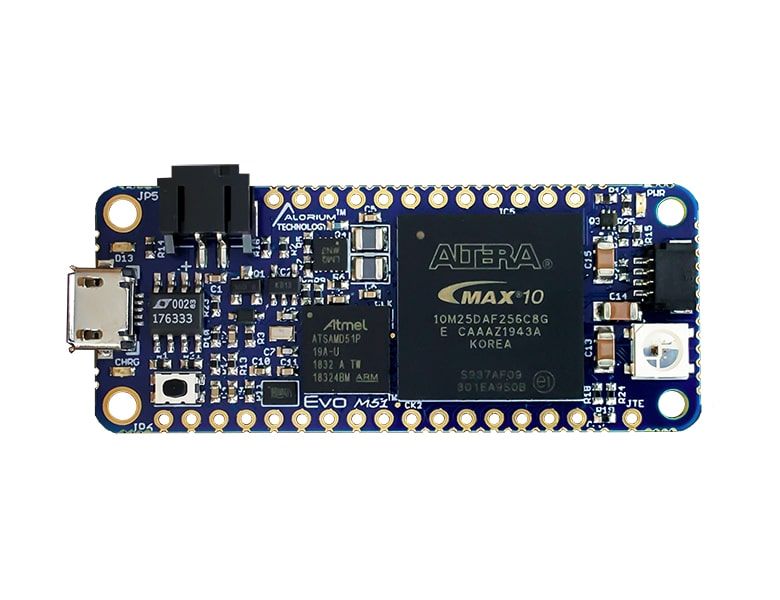
AloriumTech Evo M51 by Alorium Technology, LLC
The Evo M51 is an FPGA-enhanced Feather compatible compute module from Alorium Technology that features a 32-bit SAMD51 microcontroller along with an Intel MAX 10 FPGA.
Designed for use as an embeddable system-on-module, all of the standard Feather I/O are also routed to castellated vias along the edge of the board. There are 34 additional castellated digital I/O connected to the FPGA and accessible via the SAMD51.
Most digital I/O connections are routed through the FPGA to and from the primary and castellated I/O. This provides the opportunity for developers to immediately capture inputs or drive outputs from the FPGA without requiring direct interaction with the SAMD controller.
Evo M51 will support Alorium Technology-supplied pre-built FPGA images that target specific application use cases. In addition, designers will have the option to develop their own custom logic blocks and integrate them into the top-level MAX 10 FPGA design.
Evo was specifically designed to support running CircuitPython. It is also programmable with Arduino just like many other boards based upon the SAMD51.
Technical details
- Atmel SAMD51 32-bit ARM Cortex-M4 Microcontroller
- Intel MAX 10 FPGA
- 512 KB FLASH and 192 KB RAM
- 2 MB External QSPI FLASH
- 6 Analog Inputs
- 2 Analog Outputs
- 55 Digital I/O
- 21 Through-Hole/Castellated
- 34 Additional Castellated-Only (3.3 V inputs/ouput)
- 1 NeoPixel (
D13) - STEMMA QT (QWIIC Compatible)
- Feather Footprint
- 0.9” x 2.2” (23 mm x 56 mm)
Misc
In order to take full advantage of the additional I/O on Evo M51 using CircuitPython, we have created a custom library bundle that can be found on the Alorium Technology GitHub page:
- Evo M51 CircuitPython Library Bundle
- Download the .ZIP file
Purchase
Contribute
Have some info to add for this board? Edit the source for this page here.
CircuitPython 10.1.3
This is the latest stable release of CircuitPython that will work with the AloriumTech Evo M51. Use this release if you are new to CircuitPython.
Modules included in this download
_asyncio _bleio _bleio (HCI co-processor) _pixelmap adafruit_bus_device adafruit_pixelbuf aesio alarm analogio array atexit audiobusio audiocore audioio audiomixer binascii bitbangio bitmaptools board builtins builtins.pow3 busdisplay busio busio.SPI busio.UART codeop collections countio digitalio displayio epaperdisplay errno floppyio fontio fourwire framebufferio frequencyio getpass gifio i2cdisplaybus i2ctarget io json keypad keypad.KeyMatrix keypad.Keys keypad.ShiftRegisterKeys locale math microcontroller msgpack neopixel_write nvm onewireio os os.getenv paralleldisplaybus ps2io pulseio pwmio rainbowio random re rgbmatrix rotaryio rtc samd sdcardio select sharpdisplay spitarget storage struct supervisor sys terminalio tilepalettemapper time touchio traceback ulab usb_cdc usb_hid usb_midi vectorio warnings watchdog zlibFeatures: Feather-Compatible, Battery Charging, STEMMA QT/QWIIC, Breadboard-Friendly
CircuitPython 10.2.0-alpha.1
This is the latest development release of CircuitPython that will work with the AloriumTech Evo M51.
Alpha development releases are early releases. They are unfinished, are likely to have bugs, and the features they provide may change. Beta releases may have some bugs and unfinished features, but should be suitable for many uses. A Release Candidate (rc) release is considered done and will become the next stable release, assuming no further issues are found.
Please try alpha, beta, and rc releases if you are able. Your testing is invaluable: it helps us uncover and find issues quickly.
Release Notes for 10.2.0-alpha.1
Modules included in this download
_asyncio _bleio _bleio (HCI co-processor) _pixelmap adafruit_bus_device adafruit_pixelbuf aesio alarm analogio array atexit audiobusio audiocore audioio audiomixer binascii bitbangio bitmaptools board builtins builtins.pow3 busdisplay busio busio.SPI busio.UART codeop collections countio digitalio displayio epaperdisplay errno floppyio fontio fourwire framebufferio frequencyio getpass gifio i2cdisplaybus i2ctarget io json keypad keypad.KeyMatrix keypad.Keys keypad.ShiftRegisterKeys locale math microcontroller msgpack neopixel_write nvm onewireio os os.getenv paralleldisplaybus ps2io pulseio pwmio rainbowio random re rgbmatrix rotaryio rtc samd sdcardio select sharpdisplay spitarget storage struct supervisor supervisor.get_setting sys terminalio tilepalettemapper time touchio traceback ulab usb_cdc usb_hid usb_midi vectorio warnings watchdog zlibFeatures: Feather-Compatible, Battery Charging, STEMMA QT/QWIIC, Breadboard-Friendly
Absolute Newest
Every time we commit new code to CircuitPython we automatically build binaries for each board and language. The binaries are stored on Amazon S3, organized by board, and then by language. These releases are even newer than the development release listed above. Try them if you want the absolute latest and are feeling daring or want to see if a problem has been fixed.
Previous Versions of CircuitPython
All previous releases of CircuitPython are available for download from Amazon S3 through the button below. For very old releases, look in the OLD/ folder for each board. Release notes for each release are available at GitHub button below.
Older releases are useful for testing if you something appears to be broken in a newer release but used to work, or if you have older code that depends on features only available in an older release. Otherwise we recommend using the latest stable release.
